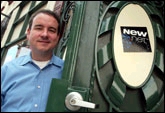

![]()
![]()
| New.net�s Impossible Dream: Can The Alternate TLD Company Reach the Unreachable Star? | |||
By Ron
Jackson
It seemed as if anything was possible during the Internet bubble era but even in those heady days New.net�s business plan went beyond simply shooting for the moon. Rather than orbit around ICANN like other domain registries, the Pasadena, California company decided they could create their own parallel universe. |
|
||
| As
the last Internet company launched by the legendary web business
incubator Idealab, it was fitting that New.net would try to
reach even higher than the inveterate risk-takers that went before
them. A quick flameout seemed assured and in the eyes of domain
speculators that is exactly what happened. Most now view the company
as a scorched cinder that flew too close to the sun and paid the
price.
Some
things are stranger than fiction (even stranger than science
fiction) but New.net, the alternate TLD company, is not only still
breathing - they are turning a profit! Some people are apparently
still registering those names ending with .travel, .shop,
.game (or
one of dozens of New.net�s other alternate extensions) and other
revenue streams seem to have appeared out of nowhere. As you are
about to see, there are more than two sides to this unusual story
and the ending most expected may have to be rewritten. New.net
was born in March 2001 because
the founders believed ICANN was dragging their feet on meeting the
demand for more meaningful web addresses. Their solution was to go around
ICANN
and offer dozens of their own extensions without the governing
body�s blessing. Most of the extensions they chose were prime
terms that others had tried (and failed) to get approved by ICANN. That
move quickly populated one opposition camp that thinks New.net and
their users should suffer the consequences if ICANN ever does an
about face and decides to claim those extensions for their own use.
In a lengthy thread about New.net at the DomainState
forum, member Safesys
said �they simply did a unilateral land grab, ignoring the
existing framework for financial gain. To reward that activity would
cause more harm than confusing the handful of people who use the New.net novelty namespace. If
New.net wanted to play in the big game
they should have done what other companies did and play by the rules
and wait. By choosing not to do that they gave up their seat at the
high stakes tables in my opinion�. However
another veteran forum member ILikeInfo,
voiced an opposing view. �New.Net grabbed the very TLD's that
ICANN had refused to issue to those who applied. I personally
thought this was a very smart move on their part. The times were
very different then and there was much interest in expanding the TLD
space. I just feel that one needs to be very sensitive about history
on this one. Innovation should never
be
rejected, though unfortunately New.Net's innovation has not
worked.� |
|||
| In
still another corner, New.net
President & CEO Dan Sheehy
claims that to the contrary, the company�s plan has worked for
them and is working for many of their customers today. Sheehy made
his case in a recent interview with Domain
Name Journal,
but before we plunge into that end of the pool, it is important to
understand the enormous obstacles that stand in the company�s way. |

Dan Sheehy |
||
When you bring a new computer home from the store and log onto the Internet you will not be able to see New.net domains unless your service provider has installed the company�s software. This lack of universal connectivity is the company�s Achilles heel but New.net thinks they are close to a cure.
To
solve the problem, they have taken a two-pronged approach. First
they try to convince all Internet Service Providers (ISP's) that they
should support New.net domains (normally in exchange for financial
considerations). Second they have lined up distributors of popular
software programs to include a New.net plug-in on their CD-ROM�s
and downloads that makes their domains visible on the enabled
computers.
The
company has made some progress on both fronts. ISP�s such as Earthlink,
Prodigy
and Juno
are on board along with software companies like Imesh
and MetaMachine
(Kazaa
recently departed). Today New.net claims that 175 million Internet
users worldwide can view their domains. As impressive as that may
sound, it is still only about 25% of the entire Internet audience.
Other users will not be able to view New.net domains unless they
type in a long form address (the company�s domains are actually sub-domains
of new.net). For example if the New.net domain is world.travel,
those who do not have enabled browsers won�t see anything unless
they type in world.travel.new.net.
With that handicap and limited awareness among surfers worldwide,
only a small percentage of Internet users ever see a New.net domain. Even so, New.net insists that the slice of the Internet pie they have is already large enough to profit their customers. Sheehy told DNJ, �In addition to providing the end customer with a descriptive web address, we're adding value to the product through a search service that we launched in 2002 that includes an exclusive section just for New.net domain holders�. Sheehy said �That search service (known as Quick!) is driving millions of visits to New.net domains and many of the customers that take advantage of it report that it provides a tangible return for them that is many multiples of the domain registration fees.� Sheehy
won�t give out the exact number of New.net domains that have been
registered but says it is in six figures which would be
comparable to some of the country code TLD�s like .WS that
are being marketed globally. The
Quick! search service is one of the primary reasons (possible
the primary reason) the company now operates in the black.
When New.net-enabled users mis-type any web address (New.net
or otherwise) in their browser they land on a Quick! Page with an
array of Pay Per Click (PPC) advertiser links. When visitors
click on those links the cash register rings at New.net. In many ways it is like Verisign�s
recently suspended Sitefinder service (which cashed in on .com
and .net address errors before it was pressured to shut
down by ICANN). New.net will not disclose what percentage of their
revenues come from the search service but Sheehy does say that there
are fundamental differences between Quick! and Sitefinder. �Though
there is a similarity between them, Quick! is really more analogous
to the way Microsoft uses Internet Explorer to direct
people to MSN Search,� Sheehy said. �While we certainly
support innovation in web navigation, we question whether Verisign
has the right to profit from the .com and .net registry operation in
this way. It's a bit like a concessionaire at a national park
discovering gold under their popcorn stand and claiming that they
should be allowed to keep it for themselves.� Since Sitefinder showed the world just how valuable errant
traffic can be, one might expect that New.net�s partners would try
to hold them up for a larger piece of the action. If that is going
to happen, Sheehy says he hasn�t seen any evidence of it yet.
�We haven't seen any meaningful impact, positive or
negative, from Verisign's Sitefinder implementation,� he told us. Quick! has worked out so well
that some now wonder if New.net is a domain registration company or
a PPC company. Sheehy doesn�t want to be pigeonholed in either
category. He said �We've always considered ourselves to be
Internet innovators and have and will always continue to be a
company focused on ways to improve Internet navigation � whether
it�s via solutions that also drive revenue to the company, such as
Quick!, or free services that we offer such as our .movie TLD
(where users can type anyname.movie instead of having to
remember long or cumbersome URLs to find their favorite movies
online). Sheehy added, �In many ways the two services
(search and domain names) complement each other, but in other ways they
are very different businesses. As a relatively small company we're
able to make it all work harmoniously without anyone suffering a job
identity crisis�. Sheehy asserts that listings in
the search service are just one feature that makes New.net domains
worthwhile to his customers (even if they are viewed as worthless by
domain speculators). He
said �Clearly
there�s a direct correlation between the resolution network behind
New.net domain names and the perceived value of the names for domain
name speculators, but there�s already great inherent value for a
large portion of domain name registrants who are using the names for
individual or business purposes � regardless if we�re reaching
25% of Internet users (as is the case today) or the entire lot�.
�In the case of some New.net
extensions, the percentage of worldwide resolution has no bearing on
its utility,� Sheehy said. �For instance, the .family
extension has been one of our most popular names among individuals
and families and the domain receives a disproportionately high amount
of total traffic compared to the number of names registered. I think
the reason for this is obvious when you consider that a family
website doesn't need everyone in the world to access it, just their group of friends and family and that is
easily handled with our simple plug-in software for any of them that
is not on an enabled ISP�. Niches like that lead Sheehy to believe there is still plenty of
room for New.net despite the abundance of new namespace that became
available with ICANN�s launch of .biz and .info and
the opening of .us to general registration in America. Sheehy says New.net will continue to grow thanks to new
partnerships with registrars like Easyspace.com, BulkRegister.com
and Registerfly.com (who just came on board) that allow
customers to buy New.net domains on those sites, right along side
the established ICANN extensions. In fact the company now sells more
domains via reseller partners than through its own site. Some have
questioned whether or not buyers on those affiliated sites
understand that their domains will not enjoy universal resolution. Though New.net can only deliver a
fraction of the Internet audience today, Sheehy said the company is
still committed to reaching 100% of the market and he believes all
ISP�s will eventually be on board. �There is no technical or
operational reason that an ISP should not update their network
with our solution, so when we hit that tipping point we think we
will see the entire world become enabled rather quickly. I would
hope that would occur within the next 24 months, but in the meantime
we are continuing to work hard to drive adoption.� �We recognized from the
beginning that this was going to take some time,� Sheehy said.
�We're encouraged at the number of registrations that have
occurred and we probably have about the same percentage of
"active" domains pointing to content as the domain name
industry in general. Our renewal rates are also on par with the
Industry in general.� Sheehy
added, �A cursory look at recent traffic activity showed over 2.7
million queries per month to New.net Web addresses were being
facilitated � and this is a conservative estimate. We still have a
long way to go, but we're encouraged at the accomplishments so far
as we approach our third anniversary.� Sheehy understands that many will
remain unimpressed by anything short of universal resolution for
New.net domains. But he believes the critics are missing an
important point. �Other viable naming systems have been introduced
into the market that don�t reach a universal audience, yet still
remain very much a part of the business and marketing landscape - AOL�s
Keywords for instance, which reaches significantly less users
than New.net. Although AOL Keywords only reach a subset of the
total Internet population, have Keyword registrants and customers
found utility in the names? Unquestionably yes.�
Sheehy said. You would think that New.net
would have very strained relations with ICANN since the company
circumvented the ICANN process. Certainly they are not bosom buddies
but Sheehy said they are on speaking terms. �We would like to have
a stronger relationship, or at least a healthy open dialog with
ICANN. We're working hard to foster that communication and I
had some informal conversations with some of the board members in
Tunisia (where the last ICANN quarterly meeting was held in
October),� he said. New.net attends those ICANN meetings to
advance their own agenda and foster additional business
relationships such as those with other registrars. ICANN could still throw New.net a
hard curve by usurping one or more of the extensions the company
currently uses. Many will recall that .biz was once operated by an
alternative registry and that the original .biz holders were left
out in the cold when ICANN took that extension for their own use.
Despite this, Sheehy does not believe his customers are likely to
face the same problem. �We think it would be
highly unlikely that a new registry or ICANN would introduce a
new TLD that conflicts with one of ours given our massive
resolution network, and the thousands of customers that are
using our products, as well as growing support for our products from
ICANN's own accredited registrars,� Sheehy said. �It would be a
highly flawed business decision for any for-profit corporation to
launch a TLD that already had a 175,000,000 user hole (the total
number of current users with access to our names). With all
the words in all the languages that could be used as a new TLD
through ICANN, I think a registry operator trying to launch a new
service would want to think long and hard before choosing a name
that New.net has been operating and nurturing for nearly three years
now.� Some think Internationalized domains (domains that use character sets other than those in English) will provide New.net with a path for further growth. Sheehy said it could happen but it�s now on the front burner. �This is an area of continued interest for us, but not a primary focus given our current efforts to continue improving upon our core product of Roman character-based domain name extensions and Internet search tools�, he said. �Without a clear market or technical standards for IDN�s our decision at this point is to participate in some of the testbed projects that are underway and to introduce our own offering when both the standards and the market are ready�. A common domain speculator
complaint against all registries is that they don�t do enough to
promote their extensions. Sheehy says you will see the New.net name
more in 2004. �I expect us to embark upon some very compelling
promotions in the New Year. We ran some interesting marketing
campaigns this year, including a charitable program that benefited Make-A-Wish
Foundation and helped raise money for children with unmet travel
wishes, and a special promotion for travel agents and travel-related
companies that promoted awareness for .travel via a car decal
program. Both generated considerable awareness and sales for
the company, our customers & partners�. Sheehy said.
New.net will undoubtedly continue to face criticism from skeptics (especially among domain speculators) but Sheehy says the company�s attention is focused elsewhere today. �Where in years past the company might�ve been overly consumed at times with issues that bubbled out of ICANN and inside the Beltway, today we�re taking a more practical look at our business and asking ourselves, �How can WE control our future success?� Sheehy said �We�ve already demonstrated over the last several years that there�s a viable role for a business like New.net within the Internet landscape, so now I feel all we have to do is continue innovating and maintain that same entrepreneurial spirit that got us where we are today. I�m confident that if we stick to our knitting, we have a bright future ahead� * * * * * Editor�s
Note: For those who would like to comment on the New.net story,
we invite you to make use of our Letters to the Editor
feature (write to [email protected])
or
join the thread at DomainState to make your own observations. If you missed our previous Cover Story click on the headline below: The
Full Monte: Why an Industry Pioneer's One Stop Shop Kept Expanding
Long After the Bubble Burst |
|||
|
|
Copyright 2003
Domain Name Journal
A Division of
Internet Edge, Inc.


